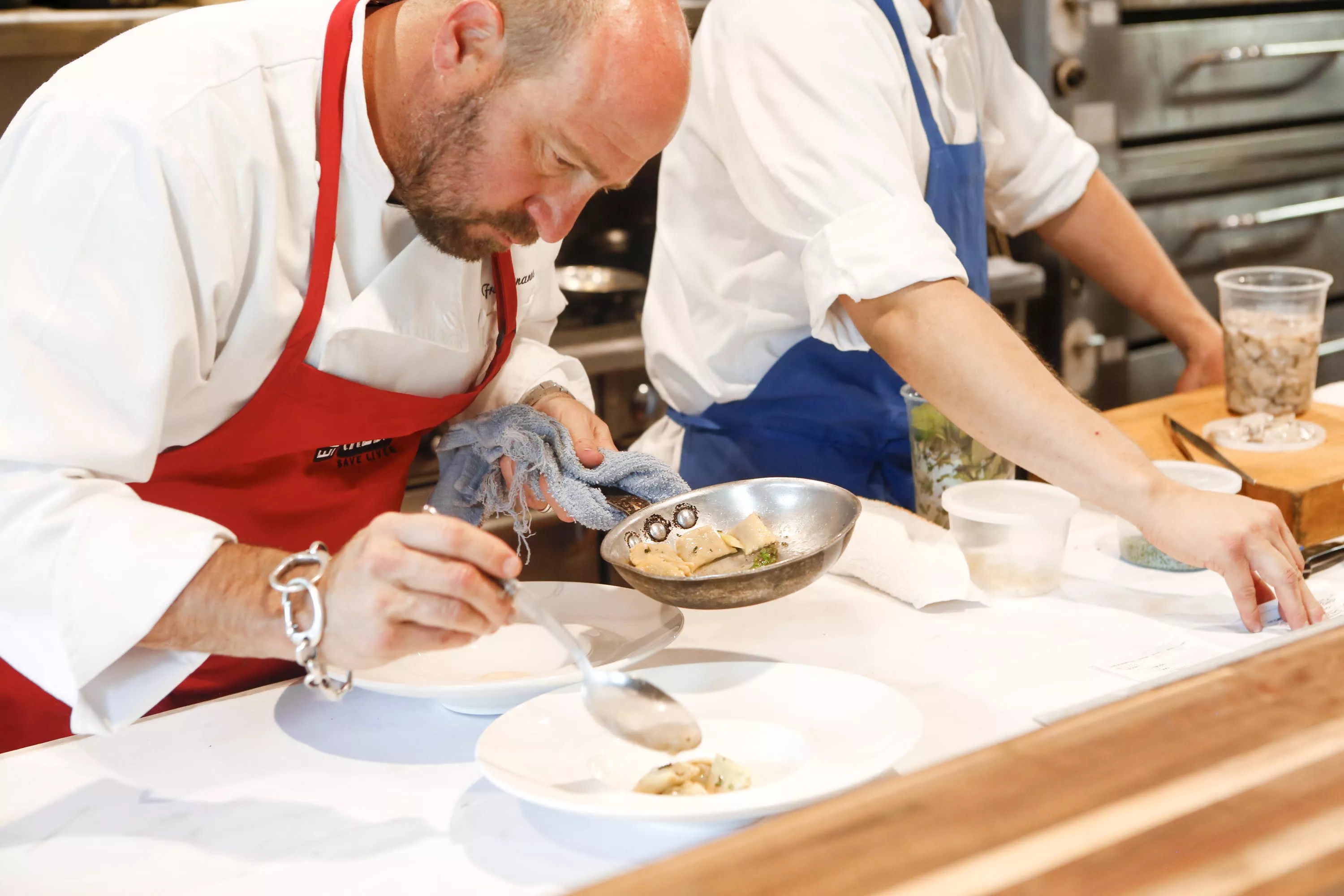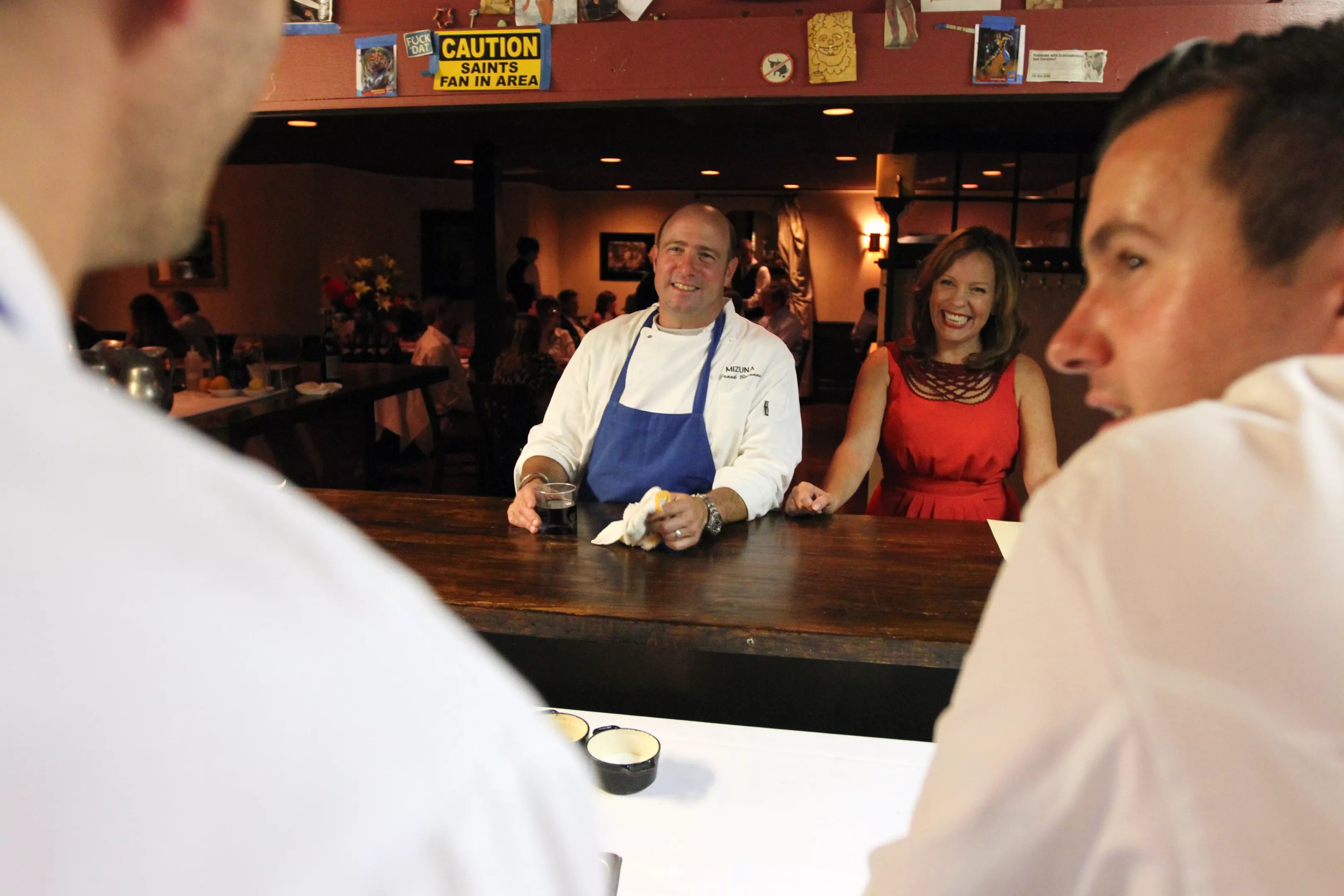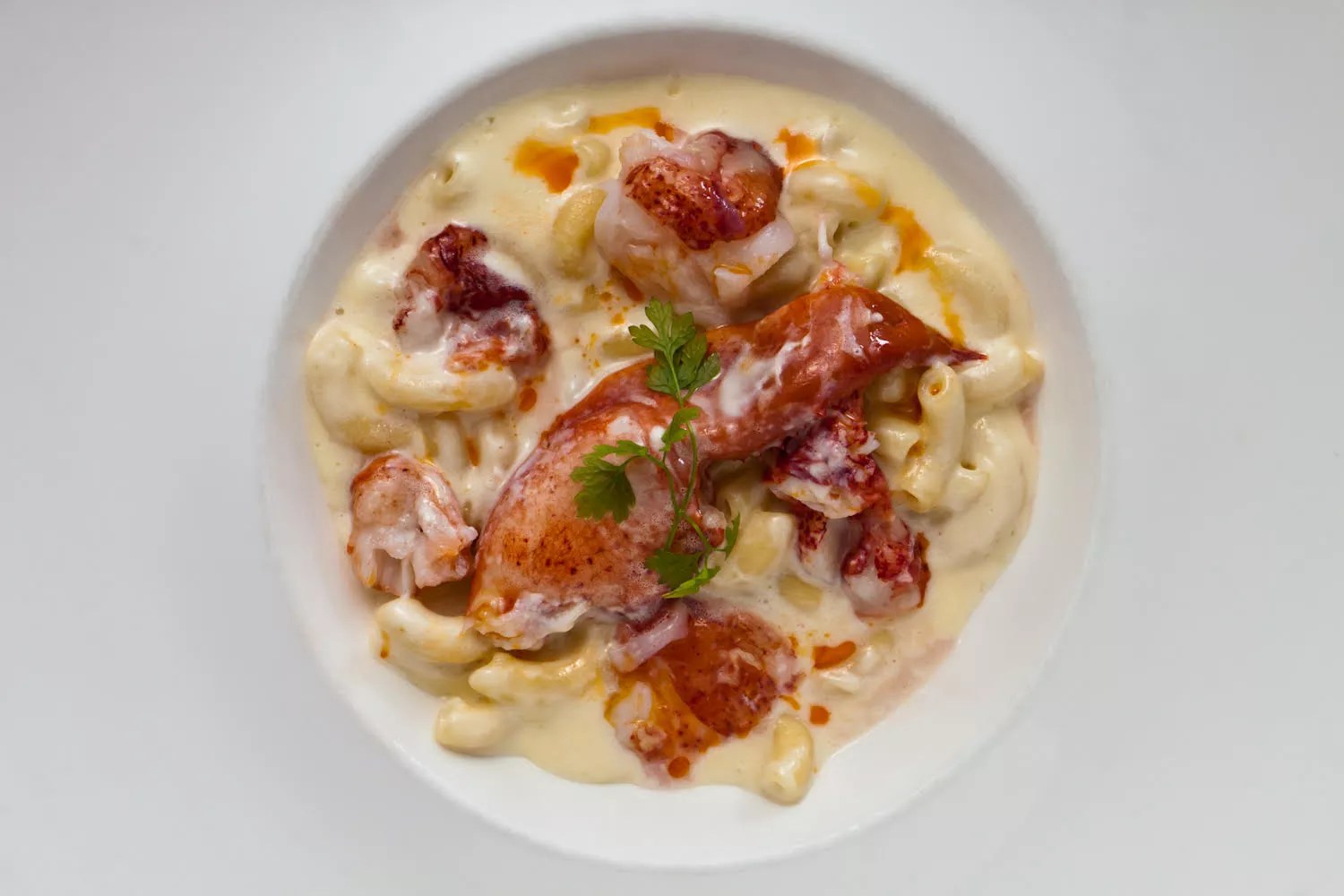
Courtesy of Bonanno Concepts

Audio By Carbonatix
A fancy new restaurant just opened in an up-and-coming neighborhood that serves a dish your friends can’t stop talking about. It’s lobster macaroni and cheese in a velvety mascarpone sauce, made as a tribute to French Laundry founder Thomas Keller, and it’s going for…$9. There’s also duck confit risotto for $7 and a healthy four-ounce slab of foie gras at a jaw-droppingly low $13.
The reason for the bargain prices? The year is 2001, and 35-year-old chef Frank Bonanno is in the kitchen at Mizuna, which just debuted that March at 225 East Seventh Avenue in Governor’s Park. Twenty years ago, those prices weren’t especially low, and some folks grumbled about entrees nearing the $30 mark. Did Bonanno think this was Chicago or New York City?
“We were probably the most expensive restaurant in town that wasn’t a steakhouse,” Bonanno recalls of Mizuna’s opening year.

Mizuna is one of several Bonanno Concepts eateries in the Governor’s Park neighborhood.
Courtesy of Bonanno Concepts
Much of the money that customers were willingly forking over at Mizuna was paying a brigade of chefs with specialized positions – a system utilized in large hotel restaurants and the finest international destinations, but nearly unheard of in Denver neighborhood restaurants. This was Bonanno’s first go as a chef/owner (in partnership with Doug Fleischmann, who died in a car accident in 2003) after working for several years for restaurateur Mel Master.
“We came from Mel’s Bar & Grill and we had a following, but I didn’t know we had a following,” Bonanno recalls, explaining that at Mel’s, a much smaller crew was turning out much more food for a hungry Cherry Creek crowd. At Mizuna, each plate had multiple touches, he explains, and the larger crew, all packed into a tiny kitchen, was able to respond quickly to specific customer requests.
“The system came from other restaurants in New York and L.A. and Chicago, and if we wanted a really good restaurant, that’s the way we had to do it,” he remembers.
Bonanno’s wife, Jacqueline, was part of the opening team in 2001; she says it was an especially memorable year because she was also pregnant with the couple’s first child. Waiting tables while nine months pregnant, she bumped into a table corner hard enough to leave a bruise and says her son Marco was born with a dent in his head (which quickly vanished).

Frank and Jacqueline Bonanno launched Mizuna in 2001 and have been part of the picture ever since.
Courtesy of Bonanno Concepts
While Mizuna may have felt ritzy to its well-heeled clientele, the opening was strictly DIY. “We opened it on a shoestring budget; we did everything ourselves,” the chef says.
“In order to purchase all of the kitchen equipment, we had to max out our credit cards,” Jacqueline adds.
While they were short of cash, they were rich in industry support, especially from chef Sean Kelly, who had just closed his restaurant, Aubergine, in the space that Mizuna took over. “Sean Kelly was super-cool and gracious about it,” Jacqueline says. “He threw a party with his regulars just to introduce us.”
Twenty years later, the couple oversees a restaurant empire that spans from a simple sandwich shop, Salt & Grinder, to a multi-counter food hall, Denver Milk Market. Was Mizuna the start of an intentional march from early acclaim as one of Denver’s first celebrity chefs of the 21st century to a restaurateur with more than a dozen openings under his belt? “We never had that idea, ever,” Bonanno says.
But a fifty-seat restaurant, even an expensive one, wasn’t likely to provide stability for a growing family. The Bonannos’ second son, Luca, arrived in 2003, and his father named his second restaurant, just around the corner from Mizuna, after the boy. Osteria Marco (named after their first son) opened in 2007, which is when Jacqueline became heavily involved in day-to-day operations and launching new projects, including Bones, which debuted in early 2009. “At the same time we were opening Bones, things started coming in waves,” Jacqueline remembers. Fortunately, she says, she thrives on the excitement of the ramp-up to opening, when she’s at her busiest hiring and training staff.
Salt & Grinder, Green Russell, Russell’s Smokehouse, Wednesday’s Pie and the original Lou’s Food Bar (on West 38th Avenue) came in quick succession after Bones. There was also the short-lived Milagro Taco Bar (which Bonanno thinks didn’t work because it was the only time he put revenue ahead of passion) and Bonanno Brothers Pizza (with that one, he says, he misread the Park Meadows customer base). Then in 2018, the Bonannos unveiled Denver Milk Market, with more than a dozen food and beverage counters under one roof.
“But it’s never been about the money, as fake as that might sound,” Bonanno insists. “When you chase the money, you lose a piece of your soul. The [restaurants] that have been successful are the ones we were passionate about.”
Through all the other openings, Mizuna has remained the flagship of Bonanno Concepts, and the place where that passion has been most evident. Some of the best young talent in Denver has started out in that tiny kitchen, including Justin Brunson, whose River Bear American Meats turns out some of the best salumi in town; Alex Seidel, who won a James Beard Award for Mercantile Dining & Provision; and Ty Leon, now the chef/co-owner at Olivia, one of the best new restaurants to open in the last year or two.
There were times, though, when Bonanno wasn’t happy with the direction his first restaurant was heading, so despite the challenges of 2020 and the coronavirus pandemic, he’s used capacity restrictions and a changing customer base to re-envision Mizuna. “The place became no fucking fun – I’m not going to lie,” he says. “We’re trying so hard to do away with that stuffiness. We want to make it an experience; we want to hear laughter and see wine flowing at every table.”
When dining rooms were forced to close on March 17, 2020, Bonanno knew that when Mizuna was able to reopen, it would have to be at partial capacity. So he and Jacqueline remodeled, adding booths and removing most of the tables, so that the eatery now seats only 27 guests. “It’s never going to be more than that now,” he promises.
The menu was changed to prix fixe only, giving diners several choices for appetizers, main courses and desserts for $95, or a chef’s tasting menu for $135. “Why not just knock their socks off?” Bonanno asks before adding that even guests who order the three-course dinner won’t be limited to the basics. “We send out plates in between courses – nobody comes to Mizuna without getting eight or nine courses.”
The reason for the changes is that Bonanno wants to have fun, and he wants his customers to have fun, too. If he sees someone trying to make a glass of wine last several courses, he’ll send out a little more; if someone says the music is too loud, he just explains that that’s the way he likes it (though he keeps the decibels low enough for everyone to enjoy conversation).

Lobster macaroni and cheese has been a favorite at Mizuna for two decades.
Courtesy of Bonanno Concepts
“In all this time, I’ve never had anything to do with any of the music at any of our restaurants,” Bonanno says, but now he’s putting on the rock and roll he grew up with, and will ax Sinatra the moment he hears it. “This past year has been the most fun cooking and waiting tables; for two and a half months, I was the sommelier.”
Even with the bonus bites between courses, Bonanno wants to have people in and out in less than an hour and a half – not to turn tables, but to make diners feel more comfortable. Still, there’s time for pre-dessert – a bite of something sweet before the real dessert course. And preference and allergy information is gathered when reservations are made, so nothing’s ever sent to a table that a diner can’t enjoy.
Like many other restaurateurs, Bonanno laid off employees at the beginning of the pandemic because there was no work in the front of the house and very little in the kitchen. And some of those employees who returned, especially in the front of the house, didn’t like the louder, livelier version of Mizuna that emerged, so turnover has been nearly complete. But executive chef Phillip Costas has remained at the helm, sharing Bonanno’s desire to keep dishes simple and perfect rather than overly cluttered.
As a result of all the changes, the average ages of guests has dropped and the reservations list has remained full.
You won’t find foie gras on the prix fixe menu this March (though it’s an occasional star on the chef’s tasting menu), but the lobster mac and cheese still holds sway on the appetizer slate. And while Bonanno was one of many in the restaurant industry to come down with COVID during this tough year (he even lost his sense of taste and smell for a short time), the other common element between now and 2001 is the sense of newness and joy.
You might find the Kinks or the Tubes pumping in the background instead of Sinatra’s “My Way,” but the chef/owner of Mizuna is back to doing things his way. “The first dance,” he says, “much like it is now, was a dream come true.”